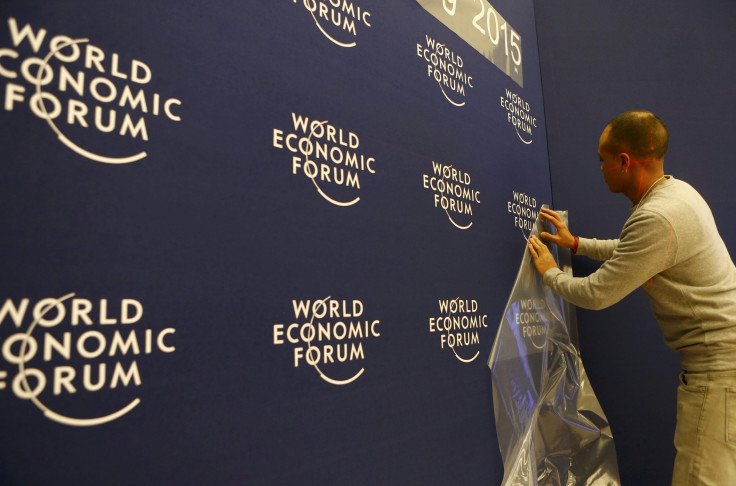In Davos, Economic Inequality On The Agenda

DAVOS, Switzerland -- If bold pronouncements were material gains, the World Economic Forum would have long since conquered human affliction and moved on to tackling the problems of distant planets. As he convened the 45th forum here in this luxurious resort in the Swiss Alps Tuesday evening, Klaus Schwab, the forum's reliably brash executive chairman, indulged in using trademark terms to lay out the mission statement of the five-day gathering.
"We are here to be passionate and to show our compassion," he declared. "Sharing and caring should be the motto of this meeting."
Lest his words at the opening ceremony fail to bring home the message, walls throughout the cavernous Congress Center were emblazoned with the forum's mantra: "Committed to Improving the State of the World."
It has never been an easy sell in some quarters, this notion that what the world needs to solve its troubles is for heads of state, billionaire investors, maestros of meditation, the odd celebrity and other sundry members of the global elite to hobnob at a glittering ski resort for a few days while dining on white truffle risotto paid for by giant financial services firms.
“The world’s elite, who are gathered at their annual strategy meeting in Davos, are encouraging us to believe powerful myths to convince us that their unequal system makes the world a better place," said Alex Scrivener, a campaigner at the London advocacy group Global Justice Now, and author of a fresh report timed to admonish the forum. "We want to undermine those ‘dangerous delusions’ to show that their policies are fueling inequality, poverty and destruction and we need radical change. Poverty is about power -- the majority of people can’t improve their lives when all the world’s resources are monopolized by an ultra rich few.”
For those inclined toward such critiques of Davos, this year's proceedings come with a hefty serving of reinforcement: Much of the talk is about conquering economic inequality, with several panels devoted to this objective.
"We want, with the help of all your collective brains, we want to help to create solutions," Schwab said during his opening address. "We are here not just to pursue our own interests; we are here really as a community of purpose to improve the state of the world."
As Schwab delivered those words, back in Washington President Obama was preparing to offer some of his own in his annual State of the Union address. Obama's presidency has played out against a backdrop of public alarm over the terms of inequality, with Americans rhetorically divided between the 1 percent and everyone else. The president was reportedly preparing to propose his own solution to unequal distribution -- lift taxes on the wealthiest American households to help pay for programs needed by the less affluent, such as free community college.
Obama is expected to propose an increase in capital gains taxes, which would raise revenue largely from people who derive substantial income from their investments. In other words, rich people.
Obama's tax plan was all but dead on arrival in a Congress now firmly under Republican control, according to the pronouncements of many Capitol Hill denizens.
"Obama's tax proposals are a nonstarter in this Congress," Tony Fratto, a former White House and Treasury spokesman in the George W. Bush administration, told the International Business Times. "We should put taxes on the things we want less of, not more of. We want more investment, not less."
Republican opposition to Obama's tax proposal is consistent with decades of party policy. In a Republican narrative running back to Reagan, Democrats stifle the vibrancy of free enterprise in reaching for the tax code to address economic problems. Better to let entrepreneurs run free and watch the benefits trickle down to the 99 percent.
Some economists say that's just politics masquerading as serious policy. Recent decades have featured hefty tax cuts for wealthy Americans along with inequality that has risen to levels last seen in the Gilded Age.
The participants in Davos include many of the greatest beneficiaries of this latest Gilded Age. Google's Eric Schmidt is here along with Facebook's Sheryl Sandberg. Jamie Dimon, chief of J.P. Morgan Chase, is in attendance as is Steven A. Schwarzman, chairman and chief executive officer of the private equity giant Blackstone Group. So is Daniel S. Loeb CEO of Third Point LLC, the New York hedge fund, who has famously accused Obama of "stirring up class warfare" in seeking to raise taxes on the wealthiest.
These are among the higher-profile participants at a forum that is supposed to be all about tackling inequality. In short, many of the same wealthy investors and executives who at home rail against paying higher taxes are now here in Davos, ostensibly pursuing an agenda of "sharing and caring."
Scrivener, the Global Justice Now campaigner, calls that a sham. His report, "The Poor Are Getting Richer, And Other Dangerous Delusions," accuses the forum of peddling bogus ideas -- that big business makes things better for ordinary people, for one. That free markets and free trade solve societal problems, for another.
Fratto, the former Bush administration spokesman -- and now a partner at Hamilton Place Strategies, a Washington communications firm -- dismissed as false the notion sincerely tackling inequality requires embracing taxation that redistributes wealth from the top down.
"Most of the sources of inequality are lower returns to labor at the bottom," he said, adding he speaks from experience. "I came from a working class Italian-American neighborhood in Pittsburgh."
A genuine attempt to tackle inequality must raise the rate of high school graduation, he said.
Today, Fratto counts himself comfortably among the 1 percent. "I earned this," he said.
It is a sentiment shared widely among the attendees here -- conspicuously on the winning side of inequality, now wandering through the snow in designer suits on the way to the next panel discussion about tackling inequality.
© Copyright IBTimes 2024. All rights reserved.











